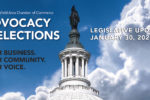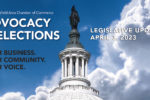2019 LEGISLATIVE REPORT – WEEK 10
[The following is an excerpt from the Oregon State Chamber of Commerce’s (OSCC) Legislative Report. Any opinions expressed or implied are those of OSCC and do not necessarily reflect those of the Springfield Chamber or its representatives. A link to the complete update can be found at the bottom of this article.]
Activity on Major Issues
The emergence of a new health care tax proposal from Governor Brown this week (HB 2269) and the full-scale threat of a new paid family leave bill (HB 2005) mean that the 2019 Oregon legislature could easily be the most costly legislature in history for local businesses.
Here are the four major tax hikes being pushed by legislative leaders. As of now, all four proposals are serious and viable:
• Health Care Tax (HB 2269) This unbelievable proposal would give the Oregon Health Authority agency the authority to determine what every large employer (defined as 50+ employees!) should be spending on health care for employees and authorizes the agency to levy a tax on every employer that does not meet the agency’s minimum health care spending requirements. The bill is designed to raise a minimum $500 million per biennium in new taxes, although it isn’t subject to the supermajority vote requirement to raise revenue.
• Paid Family Leave (HB 2005) Legislative leaders introduced this bill as the newest and most refined effort to pass a paid family and medical leave system. Bottom line: the bill gives the Employment Department the authority to levy up to a 1% payroll tax on employers and a 1% income tax on employees to implement a 26-week per year paid family leave program. The bill would apply to all employers with at least one employee. The bill must raise at least $1 billion in new taxes every biennium to fund a solvent problem.
• Cap & Trade (HB 2020) The new re-write of HB 2020, the ‘Cap & Trade’ bill, did nothing to alleviate cost concerns for manufacturers or everyday Oregonians. The new version of the bill would immediately add 16 cents per gallon in fuel costs and an immediate 30% increase in natural gas costs for residential, commercial and industrial customers. Large manufacturers will see similar and immediate cost increases for electricity. All told, we are still analyzing this bill as a $1.4 billion increase in costs for Oregonians each biennium. The vast majority of direct costs will be borne by manufacturing and transportation.
• Business Tax Increase. Our expectation is that Democratic leadership will lean toward selecting a Commercial Activity Tax, which is a pure gross receipts tax, as the basis for implementing a new business tax to add more than $2 billion in revenue each biennium into the state’s K-12 system. At this point, it does not appear that PERS reform or any other government cost savings will accompany this tax proposal. A growing coalition of business organizations, including OSCC, are now going on record as opposing a new gross receipts tax.
What is the total biennial cost to the all the tax increases that are now on the table? $5 billion.
Other Key Issues Coming up This Week
• Marijuana Accommodation (SB 379) Our biggest disappointment of the Friday deadline was that the Senate Judiciary Committee is going to attempt to pass its marijuana accommodation bill. OSCC felt very strongly that we had helped defeat this bill, but Senate Judiciary Committee chair Floyd Prozanski (D-Eugene) is going to make a last minute push to pass it. SB 379 would undermine and nullify all employers’ workplace drug-free policies and would require employers to accommodate off-duty marijuana use.
• Please respond to the OSCC ACTION ALERT on SB 379. We need to mount our defense on this issue in the Oregon Senate NOW!! The bill is scheduled for committee vote late this week.
Click Here to Read More About Upcoming Issues
Discover more from Springfield Bottom Line
Subscribe to get the latest posts sent to your email.





